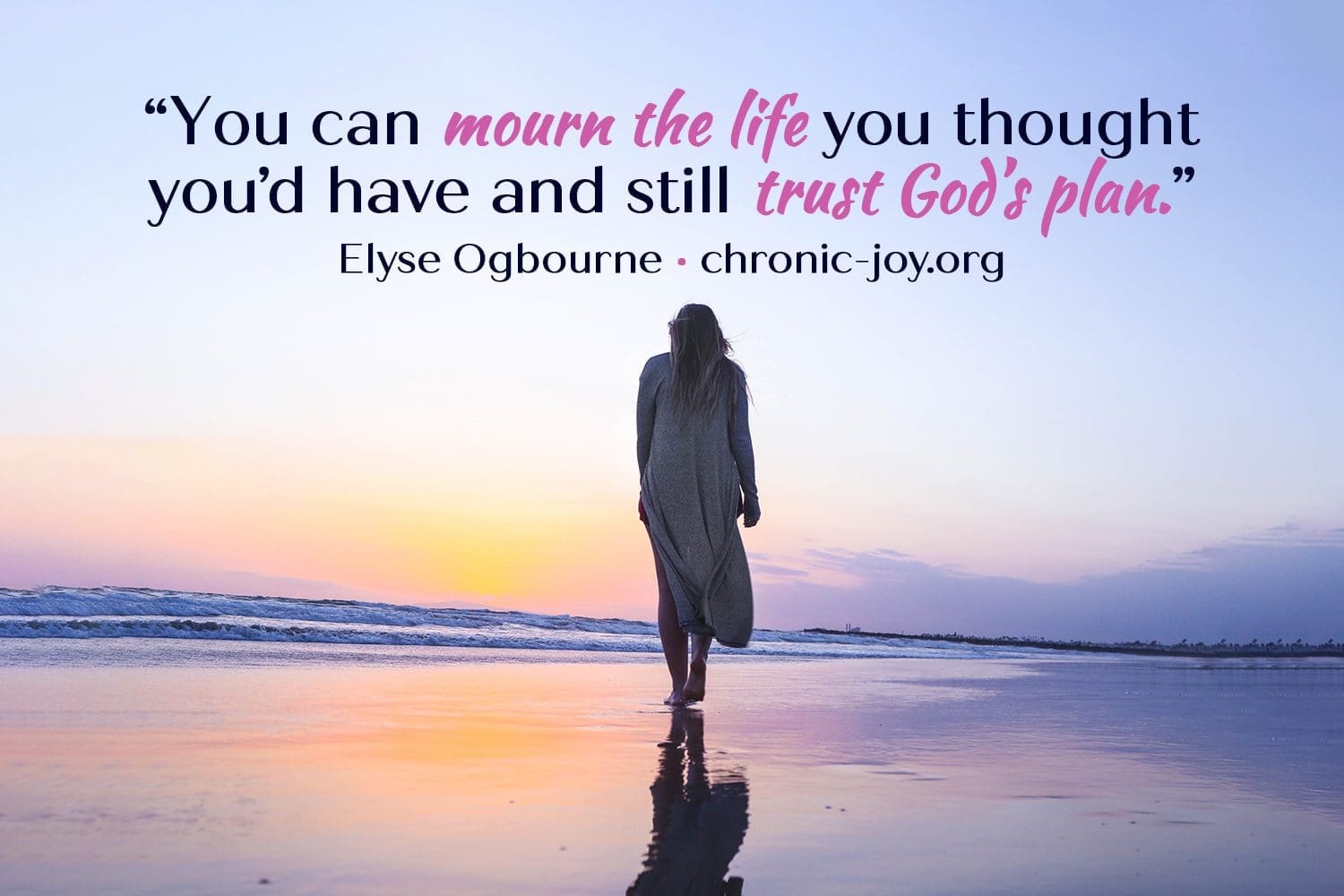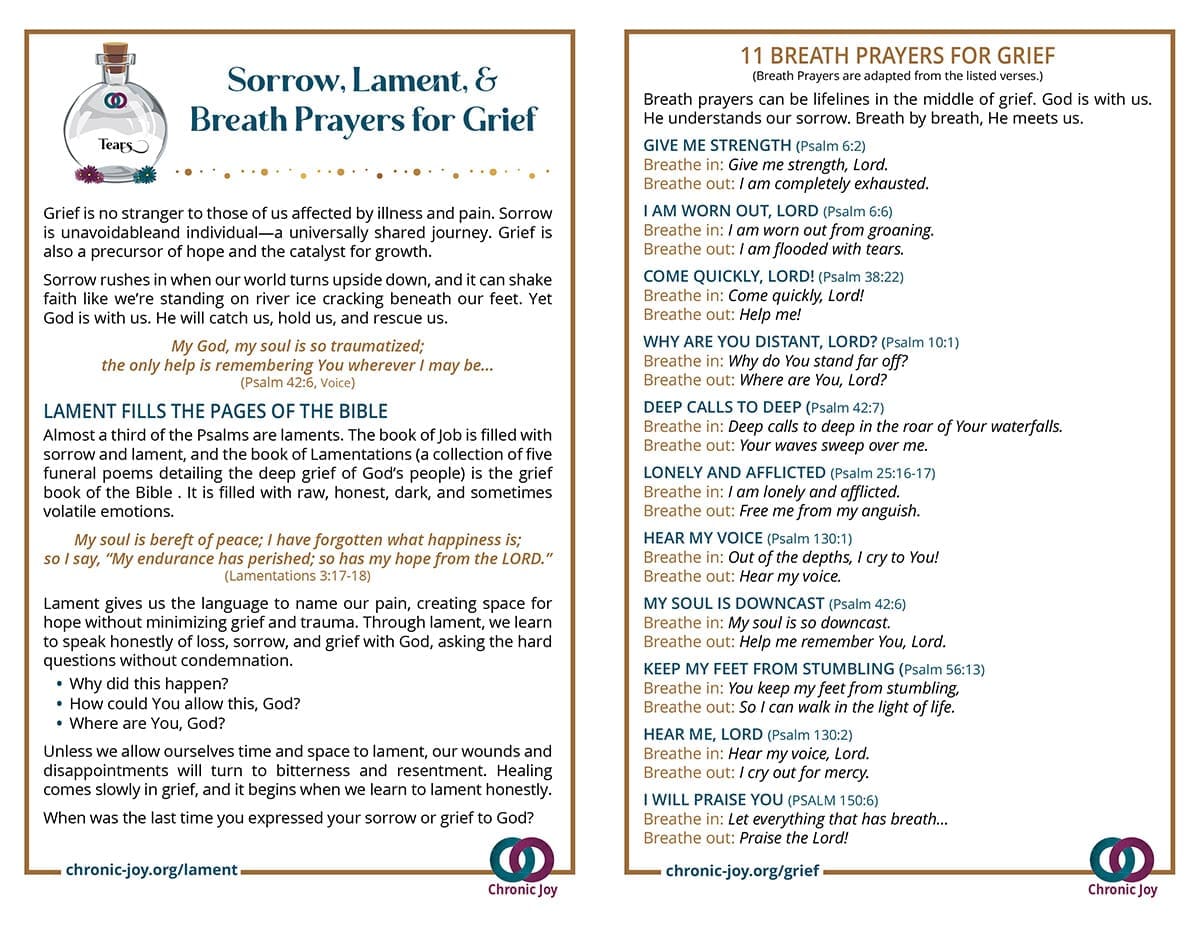
“You can mourn the life you thought you’d have and still trust God’s plan.” Elyse Ogbourne
MOURN YOUR LOSSES
Is your heart troubled by the uncertainty of the future?
Do you feel betrayal at your diagnosis?
God is big enough to take your fears and frustrations.
Why, O Lord, do you stand far away? Why do you hide yourself in times of trouble? … O Lord, you hear the desire of the afflicted; You will strengthen their heart; you will incline your ear to do justice to the fatherless and the oppressed, so that man who is of the earth may strike terror no more.
(Psalm 10:1, 17-18)
King David faced trial after trial throughout his life. He defeated the mighty Goliath and was praised by both his king and his kingdom. He then later had to flee into the wilderness when King Saul became jealous. His enemies surrounded him both when he lived in the wilderness and after he was crowned as the king of Israel. He felt despair and cried out to God: “Why have you forsaken me?” (Psalm 22) and “Why do you hide yourself?” (Psalm 10)
David was vulnerable about the pain he felt. He told God that he felt abandoned in the times he needed Him most. He did not hold back. Still, at the end of these Psalms of despair he always pointed himself (and now us) back to who he knew God to be—faithful and steadfast.
ALLOW YOURSELF TO MOURN YOUR LOSSES
When I was first diagnosed with my chronic illness, I thought I had to accept my circumstances. I knew God would use this experience for my ultimate good and His glory. He had never let me down before. My testimony was filled with the pain and sin that He had worked through with me; every day, I could see how much I had grown. How could this be any different, I thought to myself. I went into my diagnosis full of fear (because chronic illness is a scary phrase), trust, and curiosity to see how God would work through it.
I looked for good in everything—whether it be achieving a certain grade or small steps to healing or even a beautiful day. On the days when the pain was too much to do anything else, I also thanked God for YouTube and TV which I could use to distract myself from the unending fire I felt.
PUT YOUR TRUST IN GOD
I knew if I didn’t keep a positive spin, I would have to acknowledge the deeper hurt I felt—betrayal that this was the path God set me on. Why does good have to come from this pain? Then again, who am I to second guess the good God will bring from this? I refused to acknowledge my final struggle until I couldn’t take it anymore and broke down. What I hadn’t considered before is that I did not allow myself to mourn what I was going through and the loss of my old life. I reminded myself of God’s steadfastness but didn’t allow myself to mourn what I was going through.
In your life, when a teacher, coach, or parent makes a decision you don’t understand, you can ask them why they made that call. That doesn’t mean you are second guessing them; it just means you want a clearer picture. It’s the same with God. He isn’t an uncaring or unreachable God. He wants a relationship where you can bring your every hope and fear. God is big enough for your fears and frustrations. You don’t have to hold it together with Him. You aren’t second guessing His plan when you ask why. You are sitting at His feet and welcoming Him into your pain.
PRAYER
O Lord, I know that You can take all the good and the bad in my life. I know that this is the path You have given me. I trust You but I am scared, and I am hurting because of what I am facing. I pray that You can help me to be vulnerable with You about what I am feeling. I long to see the good in my chronic illness — help me also to mourn what I am going through. Amen.
QUESTIONS TO PONDER
- How do you feel towards God in regard to your chronic illness? Do you feel sad, angry, or betrayed? He wants to know how you really feel.
- What is one new way you can welcome God into your chronic illness?
- How do you see God’s steadfastness in your life—even in the midst of suffering?


Elyse Simon
Chronic Joy® Contributing Writer
Elyse has a fondness for the outdoors. After a simple slip on the ice left her with chronic pain syndrome, she began to see how God does work all things for good. Armed with Biblical truth and her TENS unit, Elyse uses her experiences to encourage young adults with the message that they can thrive in the face of difficult circumstances.

Sorrow, Lament & Grief
Grief is no stranger to those affected by chronic illness, mental illness, chronic pain, and disability. It is both a universally-shared human experience and uniquely individual.

Recent Comments